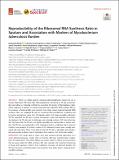Reproducibility of the ribosomal RNA synthesis ratio in sputum and association with markers of mycobacterium tuberculosis burden
Abstract
There is a critical need for improved pharmacodynamic markers for use in human tuberculosis (TB) drug trials. Pharmacodynamic monitoring in TB has conventionally used culture or molecular methods to enumerate the burden of Mycobacterium tuberculosis organisms in sputum. A recently proposed assay called the rRNA synthesis (RS) ratio measures a fundamentally novel property, how drugs impact ongoing bacterial rRNA synthesis. Here, we evaluated RS ratio as a potential pharmacodynamic monitoring tool by testing pretreatment sputa from 38 Ugandan adults with drug-susceptible pulmonary TB. We quantified the RS ratio in paired pretreatment sputa and evaluated the relationship between the RS ratio and microbiologic and molecular markers of M. tuberculosis burden. We found that the RS ratio was highly repeatable and reproducible in sputum samples. The RS ratio was independent of M. tuberculosis burden, confirming that it measures a distinct new property. In contrast, markers of M. tuberculosis burden were strongly associated with each other. These results indicate that the RS ratio is repeatable and reproducible and provides a distinct type of information from markers of M. tuberculosis burden. Importance This study takes a major next step toward practical application of a novel pharmacodynamic marker that we believe will have transformative implications for tuberculosis. This article follows our recent report in Nature Communications that an assay called the rRNA synthesis (RS) ratio indicates the treatment-shortening of drugs and regimens. Distinct from traditional measures of bacterial burden, the RS ratio measures a fundamentally novel property, how drugs impact ongoing bacterial rRNA synthesis.
Citation
Musisi , E , Dide-Agossou , C , Al Mubarak , R , Rossmassler , K , Ssesolo , A W , Kaswabuli , S , Byanyima , P , Sanyu , I , Zawedde , J , Worodria , W , Voskuil , M I , Savic , R M , Nahid , P , Davis , J L , Huang , L , Moore , C M & Walter , N D 2021 , ' Reproducibility of the ribosomal RNA synthesis ratio in sputum and association with markers of mycobacterium tuberculosis burden ' , Microbiology Spectrum , vol. 9 , no. 2 , e0048121 . https://doi.org/10.1128/Spectrum.00481-21
Publication
Microbiology Spectrum
Status
Peer reviewed
ISSN
2165-0497Type
Journal article
Description
The MIND-IHOP study was funded by the IHOP grant (NIH R01 HL090335), Lung MicroCHIP grant (NIH U01 HL098964), and K24 grant (NIH K24 HL087713). These sources provided the funding to support participant enrollment and specimen collection. Emmanuel Musisi was supported by a scholarship from the Pulmonary Complications of AIDS Research Training Program (NIH D43 TW009607). N.D.W., R.M.S., J.L.D., and P.N. acknowledge funding from the U.S. National Institutes of Health (1R01AI127300-01A1). N.D.W. and M.I.V. acknowledge funding from the U.S. National Institutes of Health (1R21AI135652-01). N.D.W. acknowledges funding from Veterans Affairs (1IK2CX000914-01A1 and 1I01BX004527-01A1) and from the Doris Duke Charitable Foundation Clinical Scientist Development Award.Collections
Items in the St Andrews Research Repository are protected by copyright, with all rights reserved, unless otherwise indicated.

